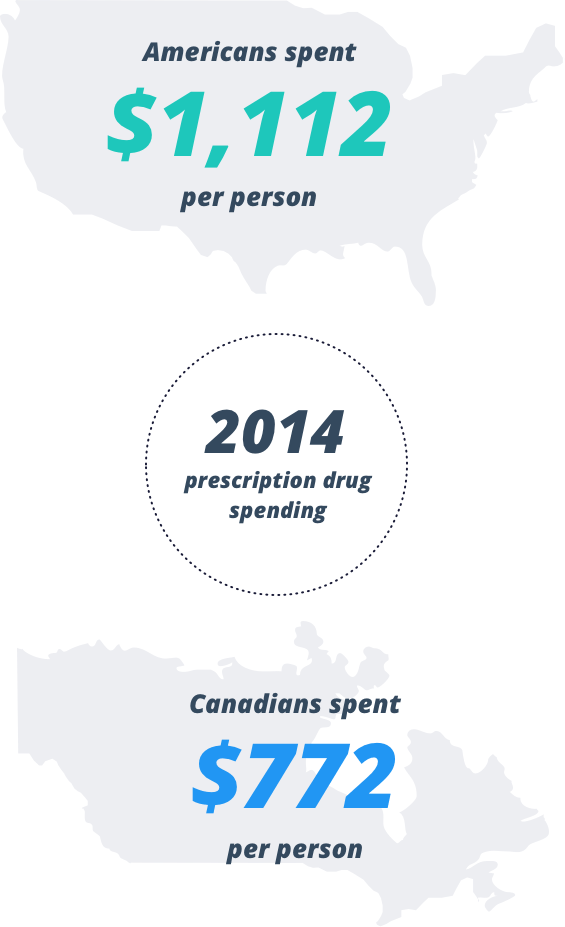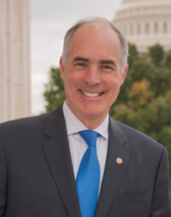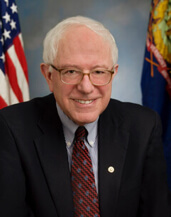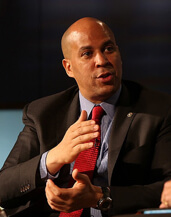Each month, Jane * breaks the law. She does this to stay alive.
Jane is a Type I diabetic, which means she requires insulin to keep living. The problem is a 10 mL bottle of insulin in the U.S. has a list price of about $450. Jane estimates it would cost her $3,000 a month to stay alive without insurance.
“So here is this medicine — it is life-saving, keeps me alive — and here we have a few companies who are preying upon people who don’t have a choice but to take this medication or we die,” she said. “So, how do we get it? How do we afford it? Where do we get it? Where are we being forced to go? The U.S. is the only country that gouges [patients]. It’s insane.”
Jane buys her insulin illegally from Canada, where a comparable bottle of insulin costs about $21.
“It makes more sense to purchase it from Canada, where life-saving medication is affordable,” she said. “These prices won’t make you make the choice between going to the grocery store to put food on the table for you and your kids or buying insulin.”
Jane is not alone. According to a 2015 Centers for Disease Control and Prevention report, nearly 5 million Americans bought their prescription medications from other countries in 2013 to save money, despite federal restrictions.
A more recent poll published in November 2016 by Kaiser Family Foundation found 19 million adults in the U.S. imported medication from Canada or other countries.
*Drugwatch is withholding this individual’s identity to protect her privacy.
19 million American adults import medication to save money – that’s 8 percent of the U.S. population.
“In the poll, people who had imported medicines ranged from college students in their 20s to retirees in their 80s,” NPR reported. “They bought medications to treat chronic conditions — such as high blood pressure and thyroid problems — as well as acute problems such as sinus infections and acne.”
The 19 million figure equates to about 8 percent of the U.S. population. Experts say this number could be even higher because many patients are too embarrassed or scared to admit to importing their medications to cut costs.
“List prices for U.S. drugs are generally the highest among all developed countries,” according to Margaret Labban, an analyst for the data analysis and consulting firm IHS Markit.
In fact, an IHS Markit report revealed drugs sold in the U.S. cost an average of 56 percent less in other high-income countries.
Prices “range from being one-third of the price in France to being just under two-thirds of the price in Japan,” Labban said in a news release. She added that prices for cardiovascular, musculoskeletal and nervous system drugs were among the cheapest in other developed countries, averaging about 80 percent lower than in the U.S.
“It is really, really mind-boggling,” Jane said. “Why is it so expensive in the U.S.? It’s infuriating.”
Drug prices in the U.S. continue to increase, as well. The Dept. of Health and Human Services reported that average prescription drug prices increased by 10% in January 2022 and another 7.8% in July 2022, higher than the same months in previous years.
2017 Prescription Drug Cost Savings
Average percentage saved outside the U.S. for select prescriptions.

France
67%

Germany
51%

Italy
53%

Spain
55%

U.K.
57%

Canada
65%

Japan
43%

Australia
60%
56%
Global Average
Source | IHS Markit POLI
How U.S. Drug Prices Compare
In Canada and other developed countries, the same prescription drugs — manufactured in the same factories, by the same companies — are available for a fraction of the price compared to in the U.S.
In fact, Americans spent $1,112 per person on prescription drugs in 2014, according to the Organisation for Economic Co-operation and Development. Canadians, on the other hand, spent $772 over the same year.

“The drug prices in the U.S. for the exact same drugs are often exponentially higher than they are in Canada and in every other country,” said Gabriel Levitt, president of PharmacyChecker.com, a company that verifies overseas pharmacies and compares prices for different drugs. “The savings that Americans can get right now can average about 70 percent when you look at the lowest prices in Canada versus prices that Americans pay at local pharmacies here.”
What’s more, a PharmacyChecker.com analysis found 70 percent of the most popular, non-controlled, brand name drugs sold in the U.S. (as identified by IMS Health data in 2015) are manufactured outside the U.S., then imported and sold to Americans at a higher price compared to patients in other countries.
Take Nexium, for example. AstraZeneca manufactures the stomach-acid drug in Sweden and sells it to consumers in the U.S., Canada, U.K., Australia, New Zealand, India and Turkey.
One 40 mg pill costs $7.78 in the U.S. compared to $3.37 in Canada. The price drops even more to $2.21 in the U.K., Australia and New Zealand. In India and Turkey, the same pill costs less than 37 cents.
Abilify is also sold at a significantly higher price in the U.S. than elsewhere in the world. Otsuka manufactures the antipsychotic drug in Japan and sells it in the U.S. for $34.51 per pill. The same pill costs $4.65 in Canada — 87 percent less than in the U.S.
“This is mostly for brand name drugs,” Levitt said. “The prices on these drugs are just much higher here.”
How Much Would You Save on Prescriptions Abroad?
Select a drug to see how its price compares in other countries.
20mg
Uses
High Blood Pressure
Drug Company
Daichi Sankyo
Dataset Based On
2Q 2017 Report
- U.S.
- Canada
- U.K., AUS, NZ
- India
- Turkey
Sources | Prices were recorded between August and September 2017 and May and June 2017. U.S. prices shown are retail cash prices listed on GoodRX.com. All other prices are from verified online pharmacies and their price comparisons on PharmacyChecker.com. Canadian prices are in U.S. dollars and come from PharmacyChecker.com 2Q | PharmacyChecker.com 3Q
* indicates price per three inhalers
Why Americans Pay More for Prescription Drugs
A number of factors can impact drug pricing, such as the costs of research and development and the amount of competition in the marketplace, said Sandy Walsh, FDA spokeswoman.
Other causes include direct-to-consumer advertising, lack of transparency, the country’s free pricing system and a ban on federal negotiation of drug prices.
-
Ban on Federal Negotiation
What We Know: Medicare is one of the biggest U.S. buyers of medicine.
The Problem: U.S. law prohibits Medicare from negotiating prices directly with drug companies.
What the Experts Say: A new report from the National Academies of Sciences, Engineering and Medicine says Congress should revise existing legislation to allow the U.S. Department of Health and Human Services to directly negotiate prices with drug producers and suppliers. “Because prices tend to be lower when the purchaser has bargaining power that is at least comparable to that of the seller, the U.S. could achieve lower prices for prescription drugs by consolidating its bargaining power,” according to the report.
What Consumers Can Do: Sign Patients for Affordable Drugs' petition to tell Congress to let Medicare negotiate lower drug prices.
-
Free Pricing System
What We Know: In the U.S., drugmakers set their own prices and have the ability to increase prices as much and as often as they wish.
The Problem: Brand-name prescription drug prices in the U.S. have increased nearly 100 percent in the past six years. Although the FDA controls what drugs are available in the U.S., the federal agency has no legal authority to regulate drug prices.
What the Experts Say: In Europe, government often sets drug prices, and prices drop over time as countries demand more and more price reductions. Although, there is no federal regulation of drug prices in the U.S., some states are taking action to control costs. California, Maryland, Nevada and Vermont, for example, have enacted drug-pricing legislation to limit unjust price increases.
What Consumers Can Do: Write to your state representatives in support of drug-pricing legislation to control costs.
-
Lack of Transparency
What We Know: Private insurers and benefit managers reach their own deals with drug companies, and the public is left in the dark when it comes to the details of those deals.
The Problem: There needs to be greater financial transparency regarding drug prices, according to Norman Augustine, former chairman of the National Academy of Engineering.
What the Experts Say: “Congress should require disclosure of information from insurance plans about the average net prices paid for prescription drugs, including patients' cost-sharing among plans, and from biopharmaceutical companies about average net volume of and prices paid for drugs across each active sales channel,” according to the National Academies of Sciences, Engineering and Medicine. The National Academies go on to say this data should be reported to the public and Congress, and the Federal Trade Commission should use it to combat anticompetitive practices.
What Consumers Can Do: Consumers can support S2157 Drug Transparency Act, a bill to require drug manufacturers to disclose the prices of prescription drugs in any direct-to-consumer advertising and marketing to practitioners of a drug.
-
Rampant Direct-to Consumer Advertising
What We Know: Drug companies spend a lot more on marketing than on research and development that could lead to new drugs, according to the National Academies of Sciences, Engineering and Medicine.
The Problem: Direct-to-consumer advertising (DTCA) of prescription drugs can adversely influence consumer choices.
What the Experts Say: “Anyone who watches television knows these ads are pervasive, and anyone who studies them knows they are contributing to the cost of prescription drugs by encouraging patients to request physicians to prescribe more costly branded medications where cheaper alternatives are available,” said Michelle Mello, professor of law and professor of health research and policy at Stanford University.
What Can Be Done: “In terms of what should be done to curb DTCA, that’s a tricky question from a legal perspective,” Mello said. “The Supreme Court has signaled increasing protectiveness toward commercial speech, and that makes it a treacherous time to try to impose direct restrictions on DTCA. Our preference was to encourage first of all industry codes of conduct that would voluntarily begin to reign in DTCA combined with the elimination of the tax credit of DTCA as a business expense through which we all essentially subsidize this socially undesirable activity."
-
Block on Competition
What We Know: Generic competition is associated with lower drug prices, according to the FDA.
The Problem: Drug companies are gaming the system to block generic competition and keep drug prices up. Drugmakers abuse patent extensions, exclusivity and restricted distribution systems, which are safety protocols that ensure drugs are distributed in a safe way. Branded companies even pay generic drugmakers not to bring cheaper options to the market (known as pay-for-delay).
What the Experts Say: The FDA can’t stop these practices, but it can help lower drug costs by approving more generic options. “The agency is committed to facilitating increased competition in the market for prescription drugs through the approval of lower-cost, generic medicines,” Walsh said.
What Consumers Can Do: Walsh recommends consumers consider contacting the Federal Trade Commission. “The FTC enforces a variety of federal antitrust and consumer protection laws,” she said. “The FTC seeks to ensure that the nation's markets function competitively, and are vigorous, efficient, and free of undue restrictions.”
Consumers can also join Patients for Affordable Drugs’ national campaign to pass the CREATES Act, which would allow generic drug companies to sue branded companies that try to block generic competition.
-
Cost of Research & Development
What We Know: Big Pharma claims the high cost of drugs is necessary to recoup costs of research and development.
The Problem: Critics say drug companies grossly exaggerate the costs involved in bringing a new drug to market and that it’s time 300 million Americans stop subsidizing the drug development for the entire world.
What the Experts Say: “We are shouldering some of the rest of the world’s burden,” Mello said. “The ethical implications of that have to be taken very seriously.”
What Consumers Can Do: Join Patients for Affordable Drugs’ campaign to demand fair pricing.

Should Americans Be Allowed to Buy Medication From Other Countries?
Data show 36 million American adults did not fill a prescription in 2016 because of the cost. This figure does not include millions of patients over the age of 65 and under the age of 18.
“This burden of high drug prices is placed on middle class Americans and it can bankrupt them and it often does bankrupt them — especially for cancer patients,” Levitt said. “To put the burden on them is unjust and unethical.”
Over the past year, several cities, counties and school districts have started helping employees buy medicines from Canada and overseas to save money, according to Kaiser Health News report. Levitt said more people could benefit from importing drugs into the U.S. now, but technically it’s against the law.
“There are real regulatory obstacles,” Levitt said. “Drug companies pay a lot of money on scare tactics to discourage Americans from buying from online pharmacies.”
36 million American adults did not fill a prescription in 2016 because of the cost.
In most circumstances, it is illegal for individuals to import drugs into the U.S. for personal use, Walsh said. This is because the agency cannot ensure the safety and effectiveness of the imported medications.
“Our top priority is to protect patients from unsafe [products] such as foreign unapproved medicines,” Walsh said. “One of the ways that we accomplish this is by protecting the closed drug distribution system that has been created by federal and state laws. There are no assurances that unapproved products from foreign sources are safe or effective – because these drugs do not have the same assurance of safety, effectiveness and quality as drugs subject to FDA oversight.”
Although the practice is illegal, the FDA tends to look the other way and not prosecute people who import prescription drugs into the U.S. for personal use.
Do’s and Don’ts of Online Pharmacies
THE FDA RECOMMENDS THE FOLLOWING IF YOU CHOOSE TO BUY MEDICATION ONLINE.
Avoid pharmacies that:
- Allow you to buy drugs without a prescription or by completing an online questionnaire
- Offer discounts or cheap prices that seem too good to be true
- Send unsolicited email or other spam offering cheap medicine
- Ship prescription drugs worldwide
- State that the drugs will be shipped from a foreign country
- Are located outside of the U.S.
- Are not licensed by a state board of pharmacy in the U.S. (or equivalent state health authority)
Look for pharmacies that:
- Require a valid prescription
- Provide a physical address in the U.S.
- Are licensed by the state board of pharmacy in your state and the state where the pharmacy is operating
- Have a state-licensed pharmacist to answer your questions
Levitt noted that most medication sold in America is imported from other countries.
“If we can do that safely it begs the question why people are saying we can’t import low-cost medications safely,” he said. “The argument against it is often hyperbolic claims about unsafe drugs.”
Affordable and Safe Prescription Drug Importation Act
Cities, counties, school districts and everyday consumers are not the only ones taking a stance on importation of prescription drugs.
The bill includes specific requirements to ensure the safety of imported drugs. Provisions include:
- FDA certification of foreign sellers
- a clear definition of what drugs may be imported
- supply chain security requirements
Senators and state representatives are proposing and supporting legislation that would lower the cost of prescription drugs by allowing Americans to import safe, low-cost medicine from Canada.
In February 2017, Sens. Bernie Sanders (I-Vt.), Cory Booker (D-N.J.) and Bob Casey (D-Pa.) introduced the Affordable and Safe Prescription Importation Act.
The legislation would instruct the secretary of Health and Human Services to put forward regulations allowing wholesalers, pharmacies and individuals to import qualifying prescription drugs from licensed Canadian sellers.
It would also grant the secretary authority in two years to permit importation from countries in the Organisation for Economic Co-operation and Development that have standards for the approval and sale of prescription drugs that are comparable to those in the U.S.
Reps. Elijah E. Cummings (D-Md.) and Lloyd Doggett (D-Texas) introduced a companion bill in the House.

“This is common-sense legislation that will allow middle class families and seniors access to safe, affordable prescription drugs through importation. No family should lack access to prescription drugs simply because of the cost; this legislation will increase competition and help more patients access life-saving drugs.”

“I am very proud to join with Sens. Booker and Casey and Reps. Cummings and Doggett and many, many others in the Senate and the House to introduce this critical legislation to lower the outrageous cost of prescription drugs. I say to President Trump: Talk is cheap. If you really have the guts to take on the pharmaceutical industry, tell your Republican friends in the House and the Senate to pass this legislation. Do it tonight in your address to Congress. Or admit to the American people that you were lying to them during the campaign.”

“After he was elected, President Trump said he would bring down drug prices. He also warned that the pharmaceutical industry is ‘getting away with murder,’ and he was absolutely right. So, if the President really means what he says, he will support our efforts, and he will encourage his Republican colleagues to do the same.”

“Life-saving medications will only save lives if people can afford them. Our common-sense legislation is a step forward, allowing for the importation of prescription drugs under a set of strong and effective standards necessary to ensure consumer safety. Since my days as Newark's mayor, I’ve been working to find ways to help more people afford prescription drugs, and this bill will do just that.”

“Prescription price gouging threatens both the health and financial security of too many Americans – overpricing is not limited to one pharmaceutical manufacturer, one CEO, or one class of drugs. It extends throughout an industry that regularly demands all that a sick or dying patient will pay to recover or just to survive a little longer. From EpiPens to insulin, from cancer to hepatitis C, families and taxpayers bear the burden of others’ greed. Today, we say, Mr. President, 'We are calling you out: stand by your campaign promise.' Act now against price gouging. Restoring some competition by allowing Americans to import more affordable drugs that meet safety standards is one step toward progress.”

“Americans have the safest prescription drug supply in the world, but struggle to afford the exorbitant cost. Consumers should not have to choose between prescription drug safety and affordability. This bill is designed to address this disconnect and ensure that Americans can access safe and affordable medication.”
For a prescription drug to be legally imported in to the U.S. under the bill, it would have to be purchased from an FDA-certified foreign seller. It must also have the same active ingredient, route of administration and strength as drugs approved in the U.S.
The new legislation would also target rogue online pharmacies — a major concern among Americans who may consider getting their drugs from outside the U.S.
“If you are going online to buy a medication, you have to be careful,” Levitt said. “There are a lot of rogue sites.”
5 Things to Know
About the Affordable and Safe Prescription Drug Importation Act
- Sens. Bernie Sanders (I-Vt.), Cory Booker (D-N.J.) and Bob Casey (D-Pa.) introduced the legislation on Feb. 28, 2017
- Reps. Elijah E. Cummings (D-Md.) and Lloyd Doggett (D-Texas) introduced a companion bill in the House
- The bill would lower the cost of prescription drugs by allowing Americans to import safe, low-cost medicine from Canada, and two years later, from other countries that meet certain criteria
- Organizations that support the bill include Alliance for Retired Americans, American Federation of Teachers, Center for Medicare Advocacy, CREDO, DailyKos, Economic Policy Institute, Justice in Aging, MoveOn, NAACP, National Center for Health Research, National Committee to Preserve Social Security and Medicare, National Organization for Women, PharmacyChecker.com, Prescription Justice, Progressive Change Campaign Committee, RxRights, Social Security Works, Democracy for America, Patients for Affordable Drugs, Consumers Union, National Nurses United, and Families USA
- Related bills include the Improving Access To Affordable Prescription Drugs Act; Medicare Drug Savings Act of 2017; Prescription Drug and Health Improvement Act of 2017; Empowering Medicare Seniors to Negotiate Drug Prices Act of 2017
‘You Can’t Afford Not To’
Though it’s illegal, risky and a process to import her insulin from another county, Jane says the benefit outweighs the risk.
She first started ordering insulin from Canada in June 2017. The pharmacy she uses does not have a license to ship medications into the U.S. Instead, the pharmacy mails the insulin to a P.O. Box Jane rents in a city in Canada.
Once the medicine arrives at the P.O. Box, an administrator calls Jane to ask what goes on the customs form. Jane says, “health items for personal use,” and the inulin gets mailed to her in the U.S. However, customs can hold shipments for up to one month (Insulin requires refrigeration for long-term stability.).
“It’s kind of a process to get medication like that,” Jane said, adding that she usually gets her medication within four days from the time it leaves the pharmacy. “The cost to mail it is pretty expensive. Still, it will be exorbitantly expensive here in the U.S. I will continue to purchase it from Canada because the cost is so cheap that you can’t afford not to order it from Canada.”
Take Action Today
Sign Prescription Justice’s petition to demand Congress pass legislation to allow Medicare drug price negotiations, end pay-for-delay and legalize importing lower cost medications.
Sign the Letter to Congress*Prescription Justice is a 501c4 non-profit organization that brings together doctors, lawyers, public health advocates and companies dedicated to lowering drug prices in the U.S.
Calling this number connects you with a Drugwatch representative. We will direct you to one of our trusted legal partners for a free case review.
Drugwatch's trusted legal partners support the organization's mission to keep people safe from dangerous drugs and medical devices. For more information, visit our partners page.


